Faith and Politics
Last night, PBS aired Makers: Women Who Make America a joint effort documentary by PBS and AOL, which chronicles the last 50 years of the women’s liberation movement in the United States.
On Friday, House GOP leaders released their own Violence Against Women Act bill that strips protection for the LGBT community by removing all mention of sexual orientation and gender identity from the bill and also adding a loophole for Native American victims.
According to a new state-by-state analysis released today by the Center for American Progress, if Congress fails to act by March 1, millions of women and children across the United States could lose the critical support and services they need.

Our country’s laws represent our values and our moral compass as Americans. They set norms, define transgressions, and mete out consequences for actions. And almost 50 years ago, our nation realized the harassment, intimidation, bureaucratic shenanigans, and violence so many African-Americans and other minority communities experienced when trying to exercise their rights to vote and participate in our great democracy. Our intolerance of such injustice led to the passage of the Voting Rights Act of 1965 — a great triumph in the defense of life, dignity, and equality.
Notwithstanding the near-universal praise the Voting Rights Act has received for ending some of the most overt discriminatory practices in our country’s voting history, there are some saying the Voting Rights Act’s time has passed. In fact, on Wednesday, the Supreme Court will hear oral arguments from Shelby County, Ala., that a key provision of the Voting Rights Act is unconstitutional and should be struck down. These arguments are misguided. The Voting Rights Act remains a vital piece of our national moral commitment never to permit racial discrimination in elections again.
Melanne Verveer, the first U.S. ambassador for Global Women’s issues has been urging governments and leaders around the world on improving the lives of women.
As she begins her new journey as the Executive Director of the Georgetown Institute for Women, Peace and Security, she reflected on her tenure as ambassador and the personal encounters that she had along the way that drove her to raise awareness on the sufferings of women. When asked about her guiding principle of women’s advocacy, Verveer cited a conversation she had with an Afghan woman in Kabul,
Please don’t see us as victims but as the women leader we are
To read more about Melanne Verveer’s leadership in empowering women, read here.

I know I am not the only one who is sick and tired of Washington’s manufactured crises around budget and deficit debates. Brinksmanship has replaced statesmanship in trying to find a sound path to fiscal responsibility. It is time to make the right moral choices that will defend the most vulnerable and pursue an opportunity agenda to reduce the highest poverty rate in 50 years.
Ideological debates over the role of government are the real battle in the nation’s capital — more than the debt crisis. Political calculations about the next election are more important to many of our political leaders than the common good of the country.
It’s just time to move on from the partisan politics that has polarized and paralyzed us for so long — by committing ourselves to moral issues that could and should bring us together. The first will be comprehensive immigration reform, which will change the lives of 12 million people in this country, lift many out of poverty, and help the economy at the same time. This is a clear example of how the faith community has changed, and now come together to become a political game changer in Washington, D.C., at both ends of Pennsylvania Avenue on both sides of the aisle.
And it’s time to make another moral commitment in the midst of our growing economic recovery — to include poor families and change poverty into opportunity. Fighting poverty must not be a partisan issue. When we look at both the causes and the solutions, this battle should bring both liberals and conservatives together. Overcoming poverty, by creating opportunity, happens because of three very basic things that most of us can agree on: family, education, and work. All three are crucial and necessary in moving people out of poverty and into opportunity.
Let’s break it down.
On Tuesday, the United Nations reported that the number of civilian casualties fell for the first time since the United Nations Assistance Mission in Afghanistan (UNAMA) started measuring casualties in 2007. However, there has been a increase in the number of Afghan women and girls killed or injured in the last year while going about their daily lives.
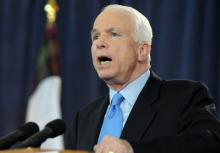
One angry constituent asked repeatedly where the “dang fence” that McCain had promised was. The senator turned to a chart illustrating how much fence had been constructed (hint: it’s a lot), and the man shot back that it was not a fence. “Oh, it’s not a fence?” McCain challenged. “OK, it’s a banana. We put up a banana with about $600 million of appropriations.”
Wow. Talk about laying down the law.
McCain even alluded to the work of the faith community on changing the message on immigration. Why are we not going to deport immigrants who have been living in the country for over 40 years? “Because we are a Judeo-Christian nation,” McCain affirmed. Mass deportation is contrary to our values.

In the 1980s television show, “Fantasy Island,” the island watchman heralded the arrival of individuals attempting to escape their reality with a call of “the plane … the plane … the plane!”
In the weeks since the Sandy Hook tragedy, I’ve spent much of my time in Washington, D.C., preaching about our moral mandate to reduce gun violence, especially in our urban neighborhoods. However, in my time in the capital, I have come to feel as though there are many arriving in Washington on the proverbial plane, escaping the realities of their hometowns, for the Fantasy Island in the beltway.
In the Book of Proverbs, we read, “Buy the truth — don't sell it for love or money; buy wisdom, buy education, buy insight (Proverbs 23:23, The Message).”
Sadly in Washington, truth seems to be for sale; wisdom seems to be radically individualized; education seems to be mocked; and insight seems to be unable to breach the partisan walls in our nation’s capital.
From the Senate staff to the 2008 campaign to the White House, Joshua DuBois has been President Obama’s top faith advisor. Last week, DuBois resigned as the director of the Office of Faith-based and Neighborhood Partnerships. On CNN Belief Blog, he shares reflections on his journey and what is ahead – writing a book, launching a new social enterprise, teaching and speaking. DuBois concludes:
“As a committed African-American Pentecostal, I never thought I could become such dear friends with so many in the faith community – Christians and Muslims, Hindus and Jews, conservatives and liberals, Republicans and Democrats – who care first about God, and second about their neighbors, and seek to live this care out into the world. I would hope to honor those friendships, continue to serve this good president, and let my life and work be a song of worship in the exciting days ahead.”
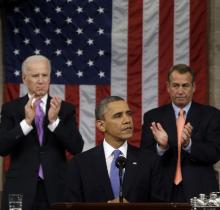
There is a tradition in the black church named “call and response.” It’s simply the experience of the preacher “calling” and the congregation “responding.” I’ve always loved it. When you’re preaching in a black church, and the congregants begin to actively and vocally respond, your sermon can actually get better, stronger, deeper, and more powerful than it might have been if everyone just sat there. Sermons get interactive. Congregations can be inspired by the preacher — and the other way around. Ideas grow, get taken further, and even develop during and after the sermon. And it can make things change.
After his first year in office, I sent a letter to President Barack Obama humbly suggesting he needed “the political equivalent of the black church’s call and response.” Just talking to and in Washington was never going to get important things done. Washington just sits there and mostly makes sure that things don’t change — and that the special interests that buy, shape, and control this city usually have their way. (That private letter to the president will be published for the first time in my new book about the common good coming out in April.)
I recalled something Obama said right after the 2008 election — that he would need “the wind of a movement at my back” to get anything really important done. He would have to go over the heads of Washington, to speak directly to the people that had elected him and also those who didn’t. He would have to have public debates about the common good and not just debate in Washington.
I saw him do that in this week’s State of the Union speech.
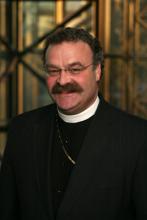
ST. LOUIS — A decision by the leader of the Lutheran Church-Missouri Synod to censure a pastor for participating in a prayer service for victims of the Sandy Hook school massacre has reopened old wounds for an often politically divided denomination.
The Rev. Matthew Harrison asked the Rev. Rob Morris, pastor of Christ the King Lutheran Church in Newtown, Conn., to apologize for participating in a public interfaith vigil with President Obama two days after a gunman killed 20 children and six adults at the town’s elementary school.
Morris apologized and Harrison accepted, but the exchange sparked a media firestorm with charges that the 2.4 million-member denomination was intolerant, insensitive or both. On Sunday, Harrison said he made a bad situation even worse.
“As president of The Lutheran Church — Missouri Synod, I take responsibility for this debacle,” he said. “I handled it poorly, multiplying the challenges. I increased the pain of a hurting community.”
Following more than 200 houses of worship being denied FEMA aid following Superstorm Sandy, on Feb. 13, the House of Representatives passed H.R. 592 with a vote of 354-72, to clarify that houses of worship are “eligible for certain disaster relief and emergency assistance on terms equal to other eligible private nonprofit facilities, and for other purposes.” From The Hill:
Supporters of the bipartisan bill, H.R. 592, said federal aid to houses of worship is not a violation of the Constitution when that aid is meant to be used broadly for a range of affected entities. In those cases, federal aid need not be withheld from houses of worship that are, like many others, seeking to repair their buildings from storm damage.
"There is no intrinsically religious purpose in providing disaster assistance," said Rep. Nick Rahall (D-W.Va.), a supporter of the bill.
Read more HERE.
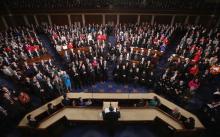
Editor's Note: Below is the full text of the 2013 State of the Union on Feb. 12. For a response to the evening's remarks, see Jim Wallis' column HERE.
Fifty-one years ago, John F. Kennedy declared to this chamber that “the Constitution makes us not rivals for power but partners for progress.” (Applause.) “It is my task,” he said, “to report the State of the Union -- to improve it is the task of us all.”
Tonight, thanks to the grit and determination of the American people, there is much progress to report. After a decade of grinding war, our brave men and women in uniform are coming home. (Applause.) After years of grueling recession, our businesses have created over six million new jobs. We buy more American cars than we have in five years, and less foreign oil than we have in 20. (Applause.) Our housing market is healing, our stock market is rebounding, and consumers, patients, and homeowners enjoy stronger protections than ever before. (Applause.)
So, together, we have cleared away the rubble of crisis, and we can say with renewed confidence that the State of our Union is stronger.
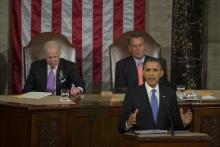
There was truth tonight in the president’s State of the Union message.
There was truth that the rising costs of health care must indeed be addressed by serious reforms in our Medicare and healthcare system — but that it’s wrong to put most of that burden on vulnerable seniors, while protecting the most powerful special interests. Truth that you should not reduce the deficit by cuts in crucial investments in education, infrastructure, science, clean energy, or programs for the most vulnerable — but leave billions of dollars in tax loopholes and deductions for the wealthy and well-connected.
Truth in the compassionate and committed words about “poverty” and “poor” children and families who deserve our attention to find ladders up from poverty. Truth that no one who works full time in the wealthiest nation on earth should have to live in poverty but have a living wage. That quality pre-school should be available to every child in America to create stable and successful families.
Not all Catholics appreciated Pope Benedict XVI’s staunch defense of Christian orthodoxy, traditional marriage, and life from conception to natural death. But American evangelicals sure did.
As word spread on Monday of Benedict’s resignation, many evangelicals lamented the impending loss of a powerful spokesman for their conservative causes.
“Pope Benedict XVI has exemplified moral courage and an unwavering commitment to the Gospel message,” said Ralph Reed, chairman of the Faith & Freedom Coalition, a conservative Christian political group.
“We honor him for his lifelong service to the Lord and his inestimable intellectual contribution to Christian orthodoxy.”
The high praise — “evangelical Benedictions,” you might say — extended beyond U.S. borders as well.